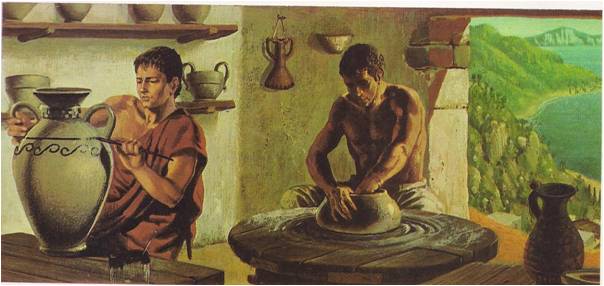THE FIRST SIGN of the approaching Roman army was a thin column of dust. It rose like smoke from behind the jagged Thracian hills of Northern Greece, which sheltered the Visigoths’ encampment. Moments later, the Visigoths, or German barbarians, as the Romans called them, could feel the ground tremble with the tread of the imperial legions. The Romans were advancing, forty thousand strong, under the personal command of the Emperor Valens. Within the Visigoths’ barricade of wagons, all was confusion. Chieftains bellowed, calling their clans together. Sturdy Visigothic warriors dragged the wagons closer together in a protective circle. Horses neighed and whinnied as their riders leaped astride them; swords were unsheathed and lances brandished. A courier spurred away from camp to summon the main body of Visigothic cavalry, foraging at some distance. It was A.D. 378 and the battle of Adrianople was about to begin. Trumpets blared and the close-packed Romans marched straight toward the barbarian enemy. Suddenly, there was a thunder of hooves on the left. A great swarm of Visigothic horsemen, summoned from their foraging expedition, galloped over the hillside. They swooped down on the Romans, as an eyewitness described it, “like a thunderbolt which strikes on a mountain top and dashes away all that stands in its path.” More horsemen poured in from the right and the front, pressing the tightly massed Romans into a death trap. The men of the legions could scarcely raise their arms to strike a blow. Again and again the horsemen charged, brandishing lance and sword. When night fell, forty thousand Roman soldiers lay dead upon the field, together with the grand master of the infantry and cavalry, the count of the palace, thirty-five commanders of horse and foot corps and the Emperor Valens himself. This great defeat was to mark the …
Read More »Kings, Tyrants and Democracy 1000 B. C. to 100 B. C.
During the Dark Ages, the large kingdoms of Homer’s Achaean heroes had disappeared. The Greek world was now dotted with dozens of little countries. They had begun with fortresses set on hills and crags. Soon each fortress was surrounded by a village, as farmers abandoned their huts in the fields and built new homes close to the walls. In times of danger, they could take refuge behind the walls. A market place was built and a few metalsmiths and potters opened shops. When temples were set up inside the fortress, the castle hill became an acropolis, a “high town,” the sacred centre of a kingdom as well as a place to hide from attackers. The village chief began to call himself a king. The New Noblemen In a kingdom not much bigger than a town, everyone could keep an eye on the king and his friends, the noblemen. The people watched their rulers carefully, for life in Greece was changing and not always for the better. Food was scarce and there was meat only on holidays. The rest of the year, the people ate mostly barley porridge and sometimes fruit and olives. Even wheat was expensive and no one had any money. The little kingdoms did not have enough olive trees to make them rich. Besides, the groves belonged to the noblemen, who never shared their profits. These new noblemen were not knights. They managed the kingdom’s business, like a town council and they kept a tight hold on their land but when it came to war, they were perfectly willing to give everyone a share in the fighting. Noblemen no longer rode to battle in chariots and fought in single combat. Battles were now fought by long lines of men who formed a deadly wall of swords and shields. …
Read More »Gods and Heroes 800 B.C. – 550 B.C.
From island to island and town to town, across the wide new world of the Greeks, the minstrel wandered, with a harp slung across his back and a batch of stories in his hand. When he knocked at the gate of a palace or great house and offered to sing for his supper, he was never refused. There were no shows to see and no books to read. The people relied on the minstrels to entertain them and to tell their stories of the past, which otherwise might be forgotten. The minstrel’s stock of stories was a mixture of tall tales, half-remembered history and myths, the stories of the gods. He collected them wherever he travelled, usually from other minstrels. As the stories were passed along from singer to singer, the history grew a little fuzzier and the tales grew a great deal taller. In the great hall of a palace, where the lord and his guests gathered in the evening, the minstrel was given a place of honour. After dinner, he was invited to sing. Most of his songs began with the Achaean attack on Troy. First, he reminded his listeners of the reason for the war: Paris, a prince Troy, stole Helen, the wife of the king of Sparta, Menelaus and the most beautiful woman in the world. The minstrel told about Agamemnon’s call to arms and the fleet that was made ready to sail. Then he listed the famous heroes who boarded the ships. Each had his own adventures and the minstrel chose different ones to tell about every evening. He might sing about Agamemnon, who came home from Troy victorious, only to be killed by his wife; or Achilles, the greatest of Greek warriors, who slew the Trojan champion Hector; or Odysseus, the craftiest of the …
Read More »


